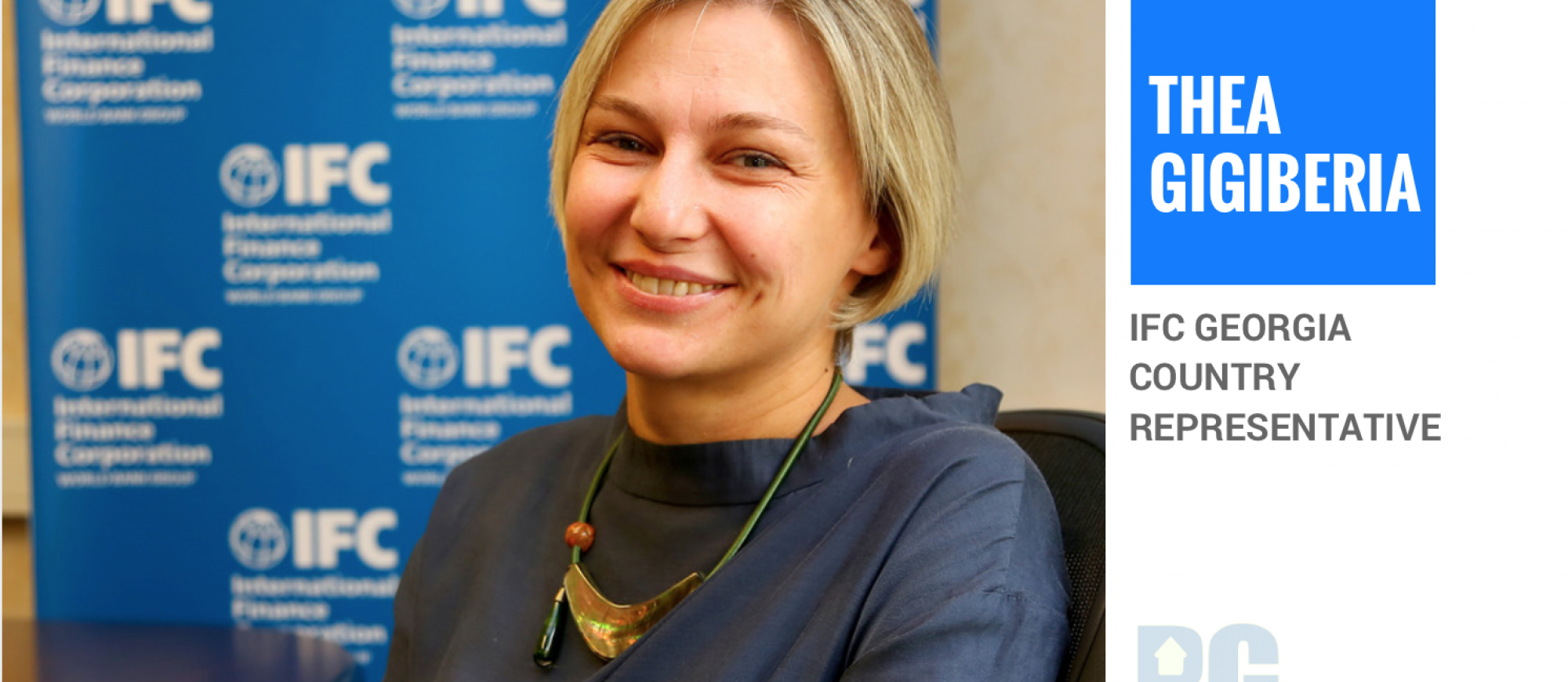Thea Gigiberia, IFC Georgia Country Representative: “IFC’s financing continues to set the standard for developing energy- efficient buildings and fostering competition in the housing sector.”
With almost $500 million in investments in Georgia’s financial sector since the 2008 crisis, the International Financial Corporation (IFC) is continuing to finance significant projects in different fields, including real estate. Property Georgia interviewed Thea Gigiberia, IFC Georgia Country Representative, regarding the leading international financial institution’s role in Georgia’s property market development and the future of the sector.
By Kate Tabatadze / PG Editorial Director
- How would you assess the development of Georgia’s property sector (potential/investment opportunities/challenges)?
- We see good potential in Georgia, which has also been reflected in the World Bank Group’s Doing Business report. Globally, Georgia improved the most in the areas measured by Doing Business over the past 12 years. During this period output per capita in Georgia increased by 66% and business density more than tripled. Many factors contributed to this improvement in economic outcomes, and the effort to make it easier for local entrepreneurs to do business may have been one of them (source: Doing Business 2016 report).
We believe that there is strong rationale for investors in that Georgia is located along a strategic corridor connecting Europe and Asia. It has significant renewable hydropower energy resources, diverse climates and landscapes that bode well for tourism, and strong potential for higher value-added agricultural production. Georgia’s Association Agreement with the European Union (EU)—signed in June 2014—is also improving the country’s longer-term growth prospects by offering more opportunities for trade and investment.
IFC, a member of the World Bank Group and the largest global development institution focused on the private sector in emerging markets, has been supporting private sector development in Georgia for the last two decades through its investment and advisory services.
Among other sectors, IFC has also invested in property development. In terms of hotel development, tourism and travel is one of Georgia’s fastest growing sectors, and a key generator of jobs. Yet the budget and mid-market hotel segments are particularly underserved, resulting in a sizable gap between supply and demand. To help address this challenge, we provided a $7 million loan to JSC m2 Real Estate’s wholly owned subsidiary in 2015 for construction and operation of a three-star hotel under the Ramada brand-name.
We aim to help develop business infrastructure, like this budget and mid-market hotel, because the availability of such infrastructure can boost both business and tourist activities. The hotel sector also generates economic activity for small businesses, which supply goods and services during construction and operations, supporting economic growth.
To help improve business infrastructure in Georgia, earlier, in 2008-2009, IFC provided financing to build the first large-scale shopping mall in the capital city, Tbilisi Mall, to help create jobs and develop the local retail sector.
Another area of support is housing. A vibrant housing sector—in addition to helping to provide shelter—is vital for economic growth. Housing is a strong job creator. Studies show that for every home built, at least three jobs are created, both directly through construction, real estate and finance and indirectly through manufacturing and services.
The residential real estate market in Georgia, especially in the capital city, has been characterized by increased demand in the last couple of years. Poorly insulated, Soviet-era apartments represent a significant part of Tbilisi’s housing stock. This as well as other factors, including mortgage lending activities from banks, are contributing to improved demand prospects in the long-term. Residential real estate is also seen as an attractive investment tool for the local population, and demand on newly constructed apartments is likely to continue growing, especially as the Soviet-type refurbished buildings are gradually replaced.
However, demand, especially for high-quality affordable housing, remains largely unmet. To help address the challenge, in 2015, IFC provided a $23 million loan to m2 Residential LLC (which includes $11.5 million mobilized from the Green for Growth Fund, Southeast Europe) to finance construction of around 1,800 apartments, which are expected to increase the efficient use of energy, water, and materials thus reducing negative impact on health and the environment.
Earlier, in 2013, IFC provided the same company a revolving loan in the amount of $14 million (including $4 million from the IFC-Canada Climate Change Program) to help develop Georgia’sfirst energy-efficient, affordable housing projects.
IFC’s financing continues to set the standard for developing energy-efficient buildings and fostering competition in the housing sector. In addition to improving people’s living standards, the project is expected to create jobs through local procurement during and after construction, contributing to country’s economic development.
- What are the criteria a property project has to meet to be eligible for IFC financing?
- Eligibility criteria is the same for any type of project in any sector.
The project must:
- Be located in a developing country that is a member of IFC;
- Operate in the private sector;
- Be technically sound;
- Have reputable owners;
- Have prospects of being profitable;
- Benefit the local economy; and
- Be environmentally and socially sound, satisfying our environmental and social standards as well as those of the host country.
- What’s your forecast regarding mortgage rates?
- On the global level, IFC works through financial institutions to build mortgage markets and increase access to finance for property construction and mortgages. In developed markets, mortgage financing is readily available, typically reaching 50 percent or more of gross domestic product. But in emerging markets, it’s often less than 10 percent of GDP. In Georgia, it’s even less than that.
In the early 2000s, IFC’s support (both advisory and investment) helped Bank of Georgia and TBC bank, currently country’s two largest banks, launch the mortgage industry in Georgia, sparking competition from others that has significantly improved home-loan terms for borrowers.
The global financial crisis has chased investors away in many sectors, including banking. To help address the challenge, IFC has provided over $450 million of long-term financing to Georgia’s financial sector in the years following the crisis. This financial boost – one of the broadest and most systemic efforts IFC has undertaken in support of any country’s financial sector – has ensured continued lending to small and medium enterprises and homeowners.
In recent years, the volume of mortgage loans issued in Georgia has increased significantly. One reason for that is the reduction in interest rates since 2010. However, the average interest rate in Georgia remains high when compared internationally.
We remain optimistic and hope that as the market gets more mature and country’s rating improves to allow financial institutions attract cheaper financing, rates will react accordingly.




